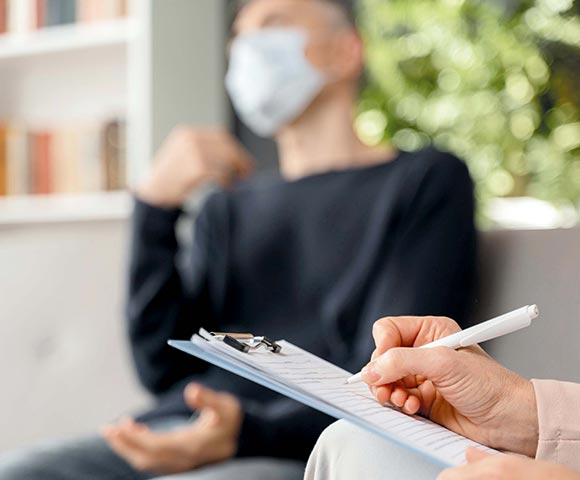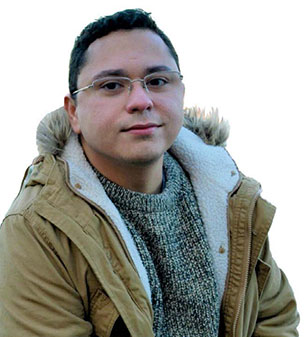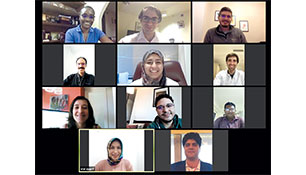Mental health care is a priority in times of COVID-19
By: Lina María Leal Villamizar
Photos:
Health and Wellness

By: Lina María Leal Villamizar
Photos:
Alberto Ulloque Beleño, a 50-year-old Colombian street vendor, decided to take his own life on April 17, 2020. Less than a month had passed since the National Government had decreed the mandatory preventive lockdown because of the COVID-19 pandemic caused by the SARS CoV-2 virus.
After three arrests for quarantine violations, the glasses-wearing informal vendor, known as “Corroncho” stated before the judge that he could not stay home because he depended on the daily earnings to feed his family. His grim economic situation is an image of what millions of people around the world have gone through because of the lockdown measures in their countries, which led to the cases of anxiety, sadness, and overwhelming hopelessness.
Just like Beleño, 800,000 people commit suicide every year, according to the World Health Organization (WHO) ). In times of pandemics, the mechanisms of adaptation have faced and even been overwhelmed by highly demanding factors that go beyond our control. Suicide rates in Japan, for example, have increased 70% in comparison to 2019, particularly among the female population. During October 2020, more Japanese people died owing to suicide (2,153) than to COVID-19 (2,087).
A group of 17 young researchers from the Asociación Psiquiátrica Mundial —under 40 years old, millennials, and representatives from all continents—collaborated to reflect on the effects on the mental well-being of the population (general and with existing disorders) as well as healthcare personnel.
The psychiatrists met virtually to conduct an “organized brainstorming” and answer questions connected with mental health in their countries and reach valid agreements. This was explained by doctor Jairo Mario González Díaz, a professor at the School of Medicine and Health Sciencies of Universidad del Rosario, who also represents Colombia in the group.
The team also includes researchers from Brazil, the United States, Paraguay, Egypt, Iran, Lebanon, Tunisia, Italy, Kosovo, Portugal, Spain, India, Indonesia, and Singapore. The purpose was to involve and represent all regions of the World Health Organization (WHO).
Following their meetings and thinking, the psychiatrists wrote a series of specialized articles aiming mainly at providing recommendations to the scientific community based on the available evidence. The first article, published in The Lancet Psychiatry in May 2020 and titled "Effect of COVID-19 on mental health: Patients and workforce", paved the way to work upon the topic from diverse views and developments, and they have already published over 12 productions in international reviews.
“The work has been excellent and dynamic. We have all had a good connection. We organized ourselves so as to have a leader and a coleader for each article. They were in charge of writing based on the data provided by the other members. We already have an important scientific production in reviews in the first, second, and third quartiles,” doctor González comments and adds that the group has provided the members required support in the hardest times of the pandemic and shared experiences to put solutions or steps into contrasts.
In the same vein, another participant, Dr. Víctor Pereira Sánchez —a psychiatrist from the Department of Psychiatry and Medical Psycology at Universidad de Na-varra in Spain and settled in New York—states that the team makes an effort to strengthen unity through alternative forums to discuss other issues, beyond the research projects “because by knowing each other better, we work better.” However, “communication is always a challenge. People participate with a minimum command of English, so as to understand at least, but it is not necessary for everybody to have the same skills, nor to master such a language, but to complement each other.”
In this manner, the group has been growing monthly, and there are some 100 members today, even from other fields, such as clinical psycology, epidemiology, and anthropology. “We see that by integrating a more comprehensive, diverse, and multidisciplinary force worldwide, we can reach farther, generate more impact, and better help public health,” points out Pereira Sánchez.

Jairo Mario González Díaz, a professor at the School of Medicine and Health Sciences at Universidad del Rosario, states: “Many patients and specialists have felt very comfortable with telemedicine. However, given the high inequality in Colombia, access to telemedicine is not homogeneous, and it is precisely in the places in which patients would benefit most where they have more difficulties in accessing the networks. Even so, generally speaking, it has been very useful during the pandemic.”
The study on the effects of COVID-19 on mental health acknowledged the importance of combining this factor with the steps taken regarding public health when the world started to fight against the virus. According to the WHO, countries spend only two percent of their healthcare budgets on mental health and during the first phase of the pandemic, it was not a priority.
“Pandemics have case number curves, with peaks, then drops, and rebounds,” the psychiatrists explain. “Based on previous epidemics, we pointed out that the effects on mental health would build up gradually. At the beginning, people are more stressed out and focused on the threat, with the high levels of adrenaline in view of the measures. However, as stress builds up and consequences are seen on the horizon, people are exposed to trauma. At this point, a peak can be reached which is sometimes late, and does not necessarily correspond with the infections or the deaths: the peak of mental health. It is a moment when people get to undergo hopelessness and reflect and think about what has happened to them.”
Mental health care fell behind and, consequently, the effect has been enormous on the population as it has generated stress, grief, fear, loneliness, and uncertainty on top of economic difficulties. Moreover, vulnerable groups such as children and young people, the relatives of people infected with COVID-19, the victims of armed conflict, or patients with mental disorders should be counted. As most of the services focused on these populations were closed, the crisis scaled up. “The impact on them is incalculable. Given their context and records, these people face a higher risk of developing depression, anxiety, sleep disorders, suicide conduct, and stress-related disorders,” states González.
In view of this situation, “telepsychiatry” or remote attention to mental health issues, thanks to technological advances, has been a growing tool around the world, which has turned out to be effective even when there are setbacks because of the gaps in access to technology. Some countries, such as Iran and Spain, had already implemented systems that were moving forward in terms of telemedicine. In other countries, the advance was still emerging, such as in the United States and Portugal. The emergency decrees in Colombia permitted the development of this technological resource, which had been making little progress previously.
Doctor González Díaz affirms that “many patients and specialists have felt comfortable with telemedicine. However, given the extreme inequality in Colombia, access to telemedicine is not homogeneous, and it is precisely in places in which patients would benefit more that they have more difficulties accessing the networks. Even so, generally speaking, it has been very useful during the pandemic.”
“Telepsychiatry” was an important reference for this group of researchers, particularly because they are millenials. As they are a generation that grew up with the Internet and social networks (the age of all the members ranges from 25 to 37 years old), they understood the potential of technologies to handle the pandemic, but also to work collaboratively with members from many countries, which quickly gave them an eagle view of the problem.
“Although it was the same moment globally, in fact, each country was experiencing a different moment of the pandemic. We could learn from other regions to propose solutions,” the researchers explain, who also highlight that in those places with a better control of the pandemic, there were better results as well in terms of mental well-being, as in New Zealand “If the pandemic goes well, mental health goes much better".
Doctor Mariana Pinto da Costa from the I South London Institute and Maudsley NHS in the United Kingdom, who also took part in the research, warns that this study, based on data collected by young psychiatrists, constitutes a call to action to improve the conditions of the workforce in mental health.
“We found that, in places with low and medium incomes, telepsychiatry was still scarce at the onset of the pandemic. It was suddenly introduced or was considerably expanded to help patients with mental disorders, mental health professionals, and healthcare staff in general at the front line,” Pinto da Costa explains
Similarly, in some countries, young psychiatrists were transferred to other services to provide support in medical attention and not in mental health, implying a conscious effort to redistribute tasks to improve the labor conditions of this.
In this context, l the healthcare population underwent very intense stress caused by the enormous responsability of facing this virus, besides the fear of getting infected or infecting their families; this happened, on occasions, with low biosecurity measures. Psychiatrist Pinto da Costa underlines that in many countries, access to protective equipment for medical staff is insufficient.
All of that involved precarious conditions for this population. In Colombia, González Díaz comments that “the medical personnel are getting vaccinated already (at the closing time of this edition); however, the labor situation of healthcare workers has not changed that much. When the pandemic started, we hoped that, in the course of it, the conditions would get better, just like the contract terms, but in fact, nothing happened. Further, if that did not happen during the pandemic, I doubt it may happen afterward.”
The study defends psychiatrists as an essential resource during the pandemic. “We have the cases of healthcare personnel who broke down,” Pereira Sánchez points out. “That made us think that we really had to stand closer and protect the healthcare staff, because if they break down, we have no other people.” Without them, there would be no defenders against this tiny but lethal virus that threatens humanity.

Members of the research team of the World Psychiatric Association (left to right): Frances Adiukwu, from Nigeria; Víctor Pereira Sánchez, from Spain currently working in the United States; Rodrigo Ramalho, from Paraguay currently working in New Zealand; Amine Larnaout, from Tunisia; Marwa Nofal, from Egypt; Joan Soler, from Spain; Mariana Pinto da Costa, from Portugal, currently working in the United Kingdom; Jairo Mario González, from Colombia; Ramdas Ransing, from India; Vivi Syariff, from Indonesia; and Mohammadreza Shalbafan, from Iran.